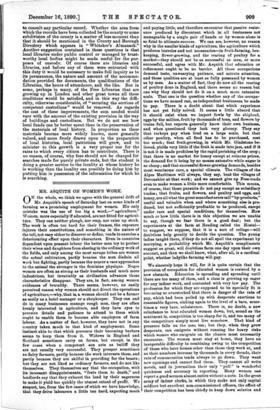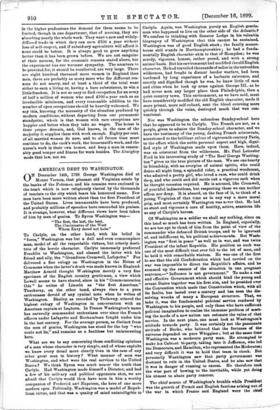MR. ASQUITH ON WOMEN'S WORK.
(IN the whole, we think we agree with the general drift of V Mr. Asquith's speech of Saturday last on some kinds of farming as a promising employment for women. His only mistake was the use of too big a word,—" agriculture." Women, more especially if educated, are not fitted for agricul- ture. They can neither plough, nor reap, nor raise up stock, The work is often too hard for their frames, the exposure injures their constitutions, and something in the nature of the toil, not easy either to discover or define, tends to exercise a deteriorating effect upon their characters. Even in countries dependent upon peasant labour the better men try to protect their wives and daughters from sharing in the ordinary work of the fields, and only among the most savage tribes are women the actual cultivators, partly because the men disdain all work bat fighting, partly because the nearer a race approaches to the animal the stronger is the feminine physique. Negro women are often as strong as their husbands and much more industrious, but invariably as civilisation advances those characteristics disappear. They are, in fact, among women evidences of brutality. There seems, however, no easily perceived reason why women should not direct the operations of agriculture,—why, that is, a woman should not be a farmer as easily as a hotel manager or a shopkeeper. They can and do in many businesses manage rough men, they are often keenly interested in agriculture, and they have eyes to perceive details and patience to attend to them which ought to enable them to become able employers of farm labour. As a matter of fact, however, they have not in any country taken much to that kind of employment. Some instinct akin to that which prevents their becoming barbers seems to keep them from it. Widows in England and Scotland sometimes carry on farms, but except, in the few cases when a competent son acts as bailiff they are not usually very successful. They prosper sometimes as dairy farmers, partly because the work interests them, and partly because they are skilful in providing for the beasts ; bat they are not liked as ordinary farmers, and do not like themselves. They themselves say that the occupation, with its incessant disappointments, "frets them to death," and landlords say that they exhaust the land by their eagerness to make it yield too quickly the utmost extent of profit. We suspect, too, from the few cases of which we have knowledge, that they drive labourers a little too hard, expecting much and paying little, and therefore encounter that passive resist. ance produced by discontent which in all businesses not manageable by a single pair of hands or by women alone is so fatal to ultimate success. We can see, however, no reason why in the smaller kinds of agriculture, the agriculture which produces luxuries and not necessaries—in fruit-farming, bee- keeping, flower-growing, and the rearing of poultry for a market—they should not be as successful as men, or more successful, and agree with Mr. Asquith that education or refinement ought to be no barrier. All these occupations demand taste, unwearying patience, and minute attention, and those qualities are at least as fully possessed by women as by men. As a matter of fact, they do now all the rearing of poultry done in England, and there seems no reason but one why they should not do it on a much more extensive scale. That one is the question whether any of the occupa- tions we have named can, as independent businesses, be made to pay. There is a doubt about that which experience has not yet fully solved. It seems a little absurd that it should exist when we import fowls by the shipload, eggs by the million, fruit by thousands of tons, and flowers by trains full, but experts generally know their own business, and when questioned they look very gloomy. They say that turkeys pay when bred on a large scale, but that other poultry, when all food has to be purchased, cost too much ; that fruit-growing, in which Mr. Gladstone be- lieved, yields very little if the fruit is made into jam, and if it is not it is made profitless by the rapid perishing of the crop ; that there is no market for honey except at ruinous prices, the demand for it being by no means extensive while sugar is so cheap ; and that successful flower-growing demands, besides most wearisome care, a special climate. The villages of the Alpes Maritimes will always, they say, beat the villages of Devonshire at that work ; and we cannot give up Free-trade even to make women a little more comfortable. This means, of course, that these pursuits do not pay except as subsidiary trades ; that fruits, and flowers, and poultry and eggs, and honey, are all what the great manufacturers call " by-products," useful and valuable when and where something else is pro- duced, but not sufficiently profitable to be produced, except under rare and special conditions, for themselves. How much or how little there is in this objection we are unable to say, though we fear there is a good deal ; but the experiments at the farm at Reading called the Hostel— to suggest, we suppose, that it is a sort of college—will doubtless help greatly to decide the question. The young ladies taught there, if they do not all spoil the experiment by marrying, a probability which Mr. Asquith's compliments suggest as great, will doubtless farm one day upon their own account, and then we shall know, what, after all, is a cardinal point, whether ladylike farming will pay.
We sincerely hope it will, for it is quite certain that the provision of occupation for educated women is resisted by a new obstacle. Education is spreading and spreading until there are too many of them, and a class is growing up eager for any indoor work, and contented with very low pay. The profession for which they are supposed to be specially fit is becoming so overstocked that there is danger of the rate of pay, which bad been pulled up with desperate exertions to reasonable figures, sinking again to the level of a bare, some- times a very bare, subsistence. There is, no doubt, a new reluctance to beat educated women down, but, sound as the sentiment is, competition is too sharp for it, and too many of the competitors simply must live somehow. That kind of pressure falls on the meu too ; but they, when they grow desperate, can emigrate without running the heavy risks which women who emigrate on the chance must necessarily encounter. The women must stay at home, they have an insuperable difficulty in combining owing to the competition of those who have homes other than those they work at, and as their numbers increase by thousands in every decade, their rate of remuneration tends always to go down. They want new openings and cannot find them. They cannot all write novels, and in journalism their only " pull " is wonderful quickness and accuracy in reporting. Many women can report a good sermon almost entire without a note. In the great army of indoor clerks, in which they make not only capital soldiers but excellent non-commissioned officers, the effect of their competition has been chiefly to keep down salaries and
in the higher professions the demand for them seems to be limited, though in one department, that of nursing, they are absorbing nearly the whole work. They want's new and widely- diffused trade in which they can earn £100 a year without loss of self-respect, and if subsidiary agriculture will afford it none could be better. It is always good to grow anything better than it has been grown before. We are not sanguine of their success, for the economic reasons stated above, but the experiment has our warmest. sympathy. The numbers to be provided for, it should be recollected, are very large. There are eight hundred thousand more women in England than men, there are probably as many more who for different rea- sons do not marry, and at least a third of the total want either to earn a living or, having a bare subsistence, to win a little freedom. It is not so easy to find occupation for an army of half a million of women who need £100 a year each as an irreducible minimum, and every reasonable addition to the number of open occupations should be heartily welcomed. We say this, knowing the necessity of the situation produced by modern conditions, without departing from our permanent standpoint, which is that women with rare exceptions are happier and better when they take no wages. The house is their proper domain, and, God knows, in the case of the majority it supplies them with work enough. Eighty per cent. of all married women do now, and to all future time must continue to do, the cook's work, the housemaid's work, and the nurse's work in their own homes, and keep a man in reason- ably good temper and fitness for work besides. The Almighty made that law, not we.











































 Previous page
Previous page